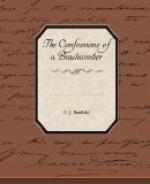Another message-stick was made on the premises by George, but not to order. A genuine, unprompted natural effort, it is merely a slip of pine, 4 inches long, a quarter of an inch broad and flat, upon which are cut spiral intersecting grooves. George’s birthplace is Cooktown, and his message-stick resembles in design that brought by Mattie from Bo’sun of Cooktown for Mickie of the Palms. Now George professes to be able to write English, but he is so shy and diffident over the accomplishment that neither persuasion nor offer of reward induces him to practise it. When he produced the “letter,” more than usual interest was taken in it, for it seemed to offer an exceptional opportunity for ascertaining the extent of his literary pretensions. I asked him—“Who this for, George?” George looked at the stick long and curiously with a puzzled, concentrated expression, as one might assume when examining a novel and interesting problem demanding prompt solution. With an enlightening smile he in time replied—“This for Charlie.”
“Charlie” is the name of a boy who recently visited the island, but who hitherto had not been known by George.
“Well, what this letter talk about?” A very long pause ensued during which George appeared to be putting his imaginative powers to frightful over-exertion. His forehead wrinkled, his lips twitched, his head moved this way and that, once or twice a gleam of inspiration passed over his face, and then the expression of the deep and puzzled thinker came on again. Finally he said—“Y-e-e-s. Me tell ’em, sometimes me see Toby.”
Toby is the tallest of the survivors of Dunk Island, another acquaintance of George’s, who refers to him as a hard case, for it is said Toby’s affections are very fitful and uncertain.
“Then that letter tell ’em something more?” The strenuous pause, the desperate plunge into thought again, and George continued—“This for Johnny Tritton, before alonga Cooktown; now walk about somewhere down here. Might be catch ’em alonga mainland!”
This message-stick was freshly made, and its meaning, had it possessed any, might have been repeated pat. But it was evident that the boy was putting a devastating strain upon an unexuberant and tardy wit when he endeavoured to ascribe to it a literary rendering. His hesitancy and contradictions were at least amusingly ingenuous.
Exceptional opportunities were available in this neighbourhood recently for the formation of an opinion upon the value of message-sticks for the transmission of intelligence. The bushman who on horseback carried His Majesty’s mails inland among the settlers and to distant stations, was frequently also entrusted with the delivery of message-sticks by blacks along the route. Invariably the stick was accompanied by a verbal communication—a request for some article (a pipe, a knife, looking-glass, handkerchief) or an inquiry as to the whereabouts or welfare of some relative or friend. The mailman quickly found that the often elaborately graven stick was to no purpose whatever without the verbal message. Frequently the sticks would become far more hopelessly mixed up than the babes in pinafore; but as long as he recollected the message aright, not the slightest concern or dissatisfaction was manifested.




